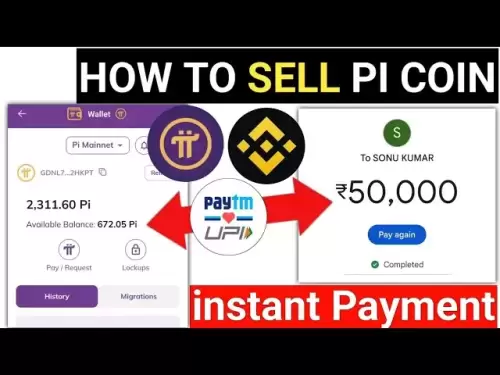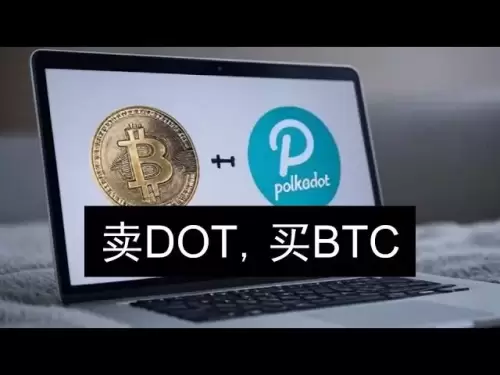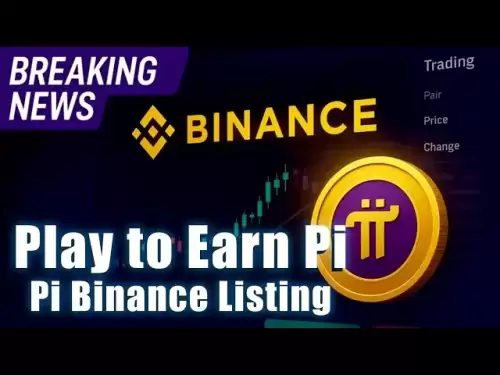 |
|
 |
|
 |
|
 |
|
 |
|
 |
|
 |
|
 |
|
 |
|
 |
|
 |
|
 |
|
 |
|
 |
|
 |
|
Articles d’actualité sur les crypto-monnaies
Video games are evolving towards decentralized models thanks to blockchain technology
May 01, 2025 at 12:59 am

The video game industry is being transformed by the introduction of decentralized models, thanks in particular to blockchain technology. This technology allows players to fully own their digital assets and perform transactions in a secure and transparent manner. Unlike traditional games, which are centralized around a company like Electronic Arts or Activision Blizzard, blockchain-based games operate autonomously, with transactions and the game's economy being managed directly by the network.
Several blockchains specialize in gaming, each presenting unique characteristics. Some, like Solana, prioritize scalability to handle a large number of users and transactions simultaneously, while others, like Tezos, focus on minimal energy consumption to render the technology more sustainable. Finally, some stand out for their security features to protect against cyberattacks and guarantee the integrity of transactions and assets.
In this article, we will analyze the most used blockchains in gaming, highlighting their specificities, advantages, and the challenges they face. Our goal is to understand their impact on the video game industry and its future.
The Ethereum blockchain in gaming
Among the first to integrate smart contracts, the Ethereum blockchain has facilitated the development of decentralized applications (dApps) and blockchain-based games. Its architecture allows for the automation of transactions and ensures total transparency in the execution of operations and the state of assets.
Today, Ethereum remains one of the most used blockchains in the Web3 gaming industry. It supports smart contracts, enabling developers to include advanced mechanics in games, such as managing digital assets in the form of NFTs. The network also benefits from a large community of developers, which fosters innovation and the creation of tools suitable for decentralized games. This massive adoption makes Ethereum a reference in the blockchain gaming sector.
Some examples of games using Ethereum
Several games rely on Ethereum, such as CryptoKitties, one of the first blockchain games, which allows players to collect and trade unique digital cats in the form of NFTs. Another iconic example is Axie Infinity, a game based on the Play-to-Earn model, where players breed, battle, and trade creatures called Axies while earning crypto rewards.
The advantages of Ethereum
The Ethereum ecosystem is mature, with rich tools and resources available to developers. Its high visibility in the blockchain universe attracts both players and investors, strengthening its adoption in the gaming industry.
The challenges of Ethereum
However, the blockchain faces technical challenges. Transaction fees, known as gas fees, are often high on Ethereum, making some interactions costly. Moreover, the network's limited scalability leads to congestion and delays, affecting the smoothness of the games.
Despite these challenges, Ethereum remains an essential blockchain for Web3 game development. Its evolution with solutions like Ethereum 2.0 and rollups could enhance its efficiency and maintain its status as a leader in the blockchain gaming field.
Binance Smart Chain (BSC) and its adoption in gaming
Binance Smart Chain (BSC) is a blockchain developed by Binance, known for its fast transactions and reduced fees. Thanks to its compatibility with the Ethereum ecosystem, it attracts many blockchain game developers. Its accessibility and performance make it an alternative to more expensive blockchains like Ethereum.
Technical characteristics
BSC is compatible with the Ethereum Virtual Machine, allowing developers to easily adapt their games initially designed for Ethereum. Its fast block time ensures better transaction responsiveness, thus reducing latencies in players' interactions with the blockchain.
Some examples of games using BSC
My DeFi Pet is a game that combines collection, monster breeding, and DeFi elements. Players buy, upgrade, and trade their creatures in the form of NFTs. Mobox, on the other hand, combines yield farming and gaming, allowing players to earn rewards by interacting with its decentralized ecosystem.
The advantages
BSC stands out for its low transaction fees, making games more accessible to a broad audience. Its interoperability with Ethereum facilitates the integration of assets and tools already existing on other blockchains.
The challenges
Despite its advantages, BSC presents relative centralization, with Binance controlling a significant part of the validators. This governance raises concerns about the actual decentralization of the network. Additionally, several attacks have targeted protocols deployed on BSC, raising concerns about the security of applications.
BSC continues to attract gaming projects due to its speed and low costs, although improvements are needed to strengthen its security and decentralization.
Solana: a solution for large-scale gaming
Solana is a high-performance blockchain, designed to host large-scale decentralized applications. Its architecture optimizes transaction speed while ensuring low fees. This combination attracts many Web3 game developers who seek a faster and more economical alternative to traditional blockchains.
Solana is distinguished by its ability to process thousands of transactions per second, significantly reducing waiting times for players. Its very low transaction fees allow users to interact with games without spending excessive amounts, making the experience more accessible.
Some examples of games using Solana
Star Atlas is a massively multiplayer space strategy game that integrates an economy based on digital assets and NFTs. Aurory, on the other hand, is a Japanese role-playing game (JRPG) that combines Play-to-Earn
Clause de non-responsabilité:info@kdj.com
Les informations fournies ne constituent pas des conseils commerciaux. kdj.com n’assume aucune responsabilité pour les investissements effectués sur la base des informations fournies dans cet article. Les crypto-monnaies sont très volatiles et il est fortement recommandé d’investir avec prudence après une recherche approfondie!
Si vous pensez que le contenu utilisé sur ce site Web porte atteinte à vos droits d’auteur, veuillez nous contacter immédiatement (info@kdj.com) et nous le supprimerons dans les plus brefs délais.
-

-

-

-

- Titre: Le chef du Cabinet, Guillermo Francos, a fait face à un congrès à griller
- Jun 15, 2025 at 11:50 pm
- Le chef du cabinet, Guillermo Francos, a fait face à un congrès à griller mardi alors qu'il défendait le rôle du président Javier Milei dans la promotion de l'échec de la crypto-monnaie «$ libra»
-

-

-

- Pi Network (PI) Struggles to Keep Up with the Recent Market Recovery, Down About 10% Over the Past Week
- Jun 15, 2025 at 11:40 pm
- Pi Network has struggled to keep up with the recent crypto market recovery, down about 10% over the past week. At $0.5832, the token is currently trading roughly 80% lower than its all-time high of $2.99. The recent trading volume, however, paints a slightly different picture. Pi Network's (PI) trading volume rose by nearly 35% over the last day, surpassing $128 million.
-

- CartelFi Capitalizes on the Resurgence of Meme Coins
- Jun 15, 2025 at 11:40 pm
- Sharing is caring!
-

























































